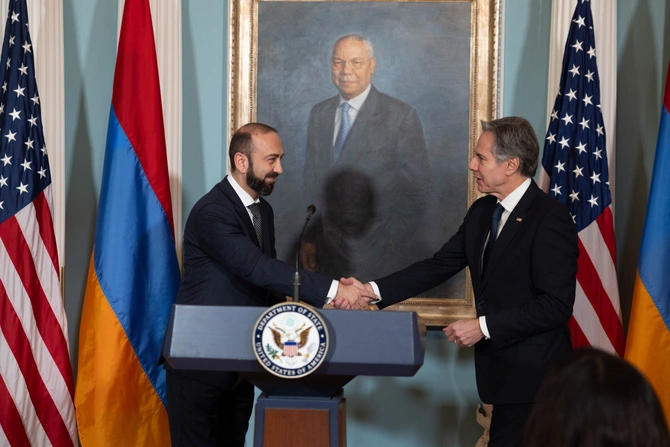
Image via Shutterstock/Rarrarorro
By Tural Heybatov
On Tuesday in Washington, Ararat Mirzoyan and Antony Blinken signed a Charter on Strategic Partnership between Armenia and the United States. This development can hardly be called unexpected. Over the past year, Yerevan's accelerated rapprochement with the West was bound to culminate in some form of agreement. The April meeting in Brussels, which brought together representatives from the U.S., the EU, and Armenia, further underscored this trajectory. The question isn’t about the signing itself but why it didn’t happen sooner, especially since the outgoing U.S. administration has clearly favored the Armenian side.
Had it been up to Armenia, the issue of strategic partnership would have been resolved long ago. For years, Yerevan has persistently sought closer ties with Washington. Armenia’s defense minister and the head of its Security Council frequently visited the U.S., holding discussions and lobbying for institutionalized Armenia-U.S. relations. Yet, Washington hesitated.
The Biden administration could have formalized this partnership much earlier, particularly since it has not shied away from its pro-Armenian stance. Why, then, did it delay?

Armenian Foreign Minister Ararat Mirzoyan and U.S. Secretary of State Antony Blinken meet in Washington (Photo: Secretary Antony Blinken, X, January 14, 2025
There are two plausible explanations.
First, Washington may have been cautious about straining relations with Azerbaijan. To avoid appearing overtly pro-Armenian, the U.S. balanced its actions with conciliatory statements, visits, and calls to Baku. Secretary of State Blinken himself had to walk back some of his team’s ill-considered remarks on several occasions.
Had the charter been signed six months or a year earlier, the situation likely wouldn’t have changed dramatically. However, one provision in the document is particularly noteworthy to Azerbaijan. It outlines the presence of an American team on the Armenia-Azerbaijan border, supplementing the EU monitoring mission. According to the charter, this team will assist Armenia in securing its borders, though the specifics remain unclear. The team is expected to arrive in Armenia next week. While it’s unlikely that U.S. representatives will be physically marking borderlines, as with the EU mission, their presence will likely serve intelligence purposes. The key question is who they will be monitoring. Some experts suggest that their primary focus could be Iran and Russia. Whether the group will consist of civilians or military personnel is another open question. While border security is typically a military matter, the charter does not explicitly mention the deployment of troops.
If this pattern continues, there might soon be little room left on Armenia's borders. With the potential for complications with Baku due to this American presence, the Biden administration appears to have passed the responsibility to its successor, which will take office after January 20.
The second explanation for the timing of this "marriage" with Yerevan is that it may be a deliberate challenge left for the next U.S. president. It is well-known that Armenia, along with its global diaspora, often proves to be a challenging partner. Strategic partnerships are not handed out freely, and it is doubtful that such a charter would have been signed under a Trump administration. Biden’s team, however, is leaving a geopolitical legacy that includes the addition of a new strategic partner, Armenia, which the next administration will now have to address. If ratified, as expected given the strength of the Armenian lobby in Congress, the charter will become a trump card for Armenia, brandished in its dealings with Azerbaijan whenever tensions arise. Yerevan, having fought long and hard for this agreement, will undoubtedly exploit it to its fullest.
Finally, the U.S. needed a replacement. With Georgia effectively sidelined, Armenia appears to be stepping into its place. It is worth noting that a similar strategic partnership charter was signed with Georgia in January 2009. However, this did not bring prosperity, territorial integrity, or security to Georgia. On the contrary, over the past 16 years, Georgia has seen increasing restrictions on its sovereignty.
Strategic partnerships, by nature, are the prerogative of individual states. Azerbaijan has no interest in who might build a nuclear power plant in Armenia or provide military consultancy-so long as it does not affect Azerbaijani interests. Let us hope that the Armenia-U.S. strategic partnership will not encroach upon our national priorities, for Azerbaijan allows no one-not even superpowers-to infringe upon its interests.
Share on social media